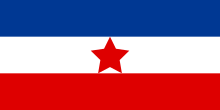
The National Committee for the Liberation of Yugoslavia (Serbo-Croatian: Nacionalni komitet oslobođenja Jugoslavije, Slovene: Nacionalni komite osvoboditve Jugoslavije, NKOJ), also known as the Yugoslav Committee of National Liberation, was the World War II provisional executive body of the Democratic Federal Yugoslavia, established on 29 November 1943 by the Yugoslav Partisans, a resistance movement and military arm of the Communist Party of Yugoslavia, led by Josip Broz Tito; in opposition to the London-based Yugoslav government-in-exile, headed by King Peter II.
The Committee was elected by Tito's Anti-Fascist Council for the National Liberation of Yugoslavia (AVNOJ), the provisional legislative body, during its second session (29–30 November 1943), in Jajce.[1] The Committee consisted of the President, three Vice-Presidents and the required number of Trustees, and for his work fit[clarification needed] the AVNOJ and the Presidency of AVNOJ, which is appointed by its members. During the same session, on 30 November 1943, the AVNOJ also appointed Josip Broz Tito as Prime Minister.
The Committee pursued the liberation in hard conditions of life, supplying the armies with many difficulties and facing the consequences of war and death on devastated battlefields, with a poor economy, and problematic foreign affairs related to the international recognition of communist Yugoslavia.
The Committee seat was in Drvar until May 1944, in Vis from May to October 1944, and then in Belgrade. On 7 March 1945, following an agreement with the Yugoslav government-in-exile (Tito–Šubašić Agreements), the Committee was lifted and a new Yugoslav provisional government was formed, with Tito still as Prime Minister.
The following list is based on the work Tito and His People by Howard Fast.[2]
As the war didn't allow all members to be in session, the Presidency appointed the following Deputy Commissioners:
{{cite book}}: |work= ignored (help)